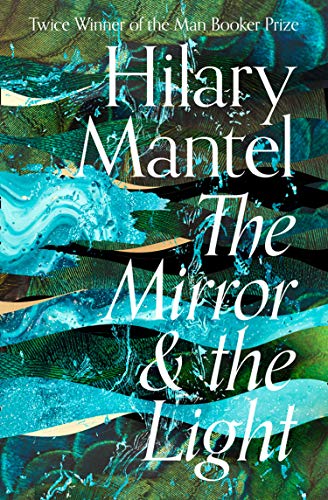Hilary Mantel: The Mirror & the Light review - magnificence must have an end | reviews, news & interviews
Hilary Mantel: The Mirror & the Light review - magnificence must have an end
Hilary Mantel: The Mirror & the Light review - magnificence must have an end
Thomas Cromwell's final rise and sudden fall made vivid in a masterpiece

Praise be to quarantine days for the chance to savour this, the crowning glory of the Wolf Hall trilogy - if not with the supernatural vigilance and attentiveness of Thomas Cromwell himself, then at least with something of the leisurely diligence it deserves. Before the reading came the very public coronation of The Mirror & the Light, Mantel ubiquitous throughout, but always her unique, authentic and incorruptible self.
How, then, to incorporate an element of thriller to an end we already know? It's all in the how: you just can't believe, for most of the first 600 or so pages, that a man of Cromwell's supreme, ever-doing eminence could fall. Only in the queasy replay or recap of events as his accusers turn his actions against him in the penultimate chapter ("Mirror" before the final "Light") do you realise how much envy and scheming must have been going on the while. Because Mantel is, as she put it in the excellent television documentary on the phenomenon, behind Cromwell's eyes nearly all the time - there are a few startling departures, like the one before Jane Seymour's shockingly sudden death following childbirth - and we see only what he does and thinks. Certainly he's guilty of one sin - hubris - and sends many to the end he himself meets; and yet even that is offset by a consciousness of always being the king's discardable thing of service, with no way out.

Jane's abrupt tragedy gives way to the initial comedy of finding another wife for the king without any meeting in person. Holbein plays his part again, and Cromwell has to pull all the strings, possibly the cue for his ultimate demise. The scene where Henry steals unexpectedly in on Anna and repels her is the last flicker of amusement before the ritual turns queasy (Mantel makes much of the Cleves Princess's hard winter journey and its outcome: "she left the ship as Anna. Now she is land-locked as plain Anne, as if the king and all his treasury has not a syllable to spare"). Then there's the giddying juxtaposition of Cromwell's final elevation as Earl of Essex and his plunge. The last two chapters take us on a final roller-coaster ride with a look back on the previous volumes' principal relationships - with Wolsey and then with More - and last glimpses of a past as the son of a brutal blacksmith which has so often surfaced, along with the ghosts Mantel is always so adept at summoning.
 Masterly as always are the meetings with the slippery king, inside whose head as divine regent we are briefly allowed to enter. But for all that, Henry remains monstrously capricious, "like the shrike or butcher bird, who sings in imitation of a harmless seed-eater to lure his prey, then impales it on a thorn and digests it at his leisure". There are passages of lyrical reflection in between all the doing and being done by: I know of no more perfect writing in a novel than the paragraphs on reflection in twilight which begin "Don't look back, he had told the king" (pages 249-251).
Masterly as always are the meetings with the slippery king, inside whose head as divine regent we are briefly allowed to enter. But for all that, Henry remains monstrously capricious, "like the shrike or butcher bird, who sings in imitation of a harmless seed-eater to lure his prey, then impales it on a thorn and digests it at his leisure". There are passages of lyrical reflection in between all the doing and being done by: I know of no more perfect writing in a novel than the paragraphs on reflection in twilight which begin "Don't look back, he had told the king" (pages 249-251).
For Cromwell's imprisonment and execution Mantel summons her supreme eloquence, mixed in with the pith of the outrageous accusations. Yes, reader, I shed a tear. And it's so typical of this writer's imaginative precision that even the epigraph, "author's note" on the aftermath and acnowledgments are utterly original. Beautifully produced and proofread (I spotted only one typo), the hardback may be hard to hold but it's a physical pleasure to read.
Where next? I need to read Diarmaid MacCullough's historical biography for a perspective on Cromwell's full achievement - lucky indeed that he has a sense of style too - and I can't wait for the third volume of what can without tackiness be described as "the Estonian Wolf Hall" inasmuch as it deals with another real historical figure of the 16th century caught between the worlds of his commoner past and elevated status, Jaan Kross's Between Three Plagues trilogy (originally tetralogy - published between 1970 and 1980, it has only recently been translated into English by Merike Lepasaar Beecher; MacLehose Press is due to publish the final instalment this summer). As for Mantel, we can now only wait for the fresh astonishment of where her rigorous imagination will alight next.
rating
Explore topics
Share this article
Add comment
The future of Arts Journalism
You can stop theartsdesk.com closing!
We urgently need financing to survive. Our fundraising drive has thus far raised £49,000 but we need to reach £100,000 or we will be forced to close. Please contribute here: https://gofund.me/c3f6033d
And if you can forward this information to anyone who might assist, we’d be grateful.

Subscribe to theartsdesk.com
Thank you for continuing to read our work on theartsdesk.com. For unlimited access to every article in its entirety, including our archive of more than 15,000 pieces, we're asking for £5 per month or £40 per year. We feel it's a very good deal, and hope you do too.
To take a subscription now simply click here.
And if you're looking for that extra gift for a friend or family member, why not treat them to a theartsdesk.com gift subscription?
more Books
 'We are bowled over!' Thank you for your messages of love and support
Much-appreciated words of commendation from readers and the cultural community
'We are bowled over!' Thank you for your messages of love and support
Much-appreciated words of commendation from readers and the cultural community
 Frances Wilson: Electric Spark - The Enigma of Muriel Spark review - the matter of fact
Frances Wilson employs her full artistic power to keep pace with Spark’s fantastic and fugitive life
Frances Wilson: Electric Spark - The Enigma of Muriel Spark review - the matter of fact
Frances Wilson employs her full artistic power to keep pace with Spark’s fantastic and fugitive life
 Elizabeth Alker: Everything We Do is Music review - Prokofiev goes pop
A compelling journey into a surprising musical kinship
Elizabeth Alker: Everything We Do is Music review - Prokofiev goes pop
A compelling journey into a surprising musical kinship
 Natalia Ginzburg: The City and the House review - a dying art
Dick Davis renders this analogue love-letter in polyphonic English
Natalia Ginzburg: The City and the House review - a dying art
Dick Davis renders this analogue love-letter in polyphonic English
 Tom Raworth: Cancer review - truthfulness
A 'lost' book reconfirms Raworth’s legacy as one of the great lyric poets
Tom Raworth: Cancer review - truthfulness
A 'lost' book reconfirms Raworth’s legacy as one of the great lyric poets
 Ian Leslie: John and Paul - A Love Story in Songs review - help!
Ian Leslie loses himself in amateur psychology, and fatally misreads The Beatles
Ian Leslie: John and Paul - A Love Story in Songs review - help!
Ian Leslie loses himself in amateur psychology, and fatally misreads The Beatles
 Samuel Arbesman: The Magic of Code review - the spark ages
A wide-eyed take on our digital world can’t quite dispel the dangers
Samuel Arbesman: The Magic of Code review - the spark ages
A wide-eyed take on our digital world can’t quite dispel the dangers
 Zsuzsanna Gahse: Mountainish review - seeking refuge
Notes on danger and dialogue in the shadow of the Swiss Alps
Zsuzsanna Gahse: Mountainish review - seeking refuge
Notes on danger and dialogue in the shadow of the Swiss Alps
 Patrick McGilligan: Woody Allen - A Travesty of a Mockery of a Sham review - New York stories
Fair-minded Woody Allen biography covers all bases
Patrick McGilligan: Woody Allen - A Travesty of a Mockery of a Sham review - New York stories
Fair-minded Woody Allen biography covers all bases
 Howard Amos: Russia Starts Here review - East meets West, via the Pskov region
A journalist looks beyond borders in this searching account of the Russian mind
Howard Amos: Russia Starts Here review - East meets West, via the Pskov region
A journalist looks beyond borders in this searching account of the Russian mind
 Henry Gee: The Decline and Fall of the Human Empire - Why Our Species is on the Edge of Extinction review - survival instincts
A science writer looks to the stars for a way to dodge our impending doom
Henry Gee: The Decline and Fall of the Human Empire - Why Our Species is on the Edge of Extinction review - survival instincts
A science writer looks to the stars for a way to dodge our impending doom
 Jonathan Buckley: One Boat review - a shore thing
Buckley’s 13th novel is a powerful reflection on intimacy and grief
Jonathan Buckley: One Boat review - a shore thing
Buckley’s 13th novel is a powerful reflection on intimacy and grief

Comments
Its a superb book,
So do I. One can never have
So do I. One can never have too much of Mantel's insights, and as I suggested, it has a fine underlying structure. Surely we were all as sorry to let go of Cromwell as she was.